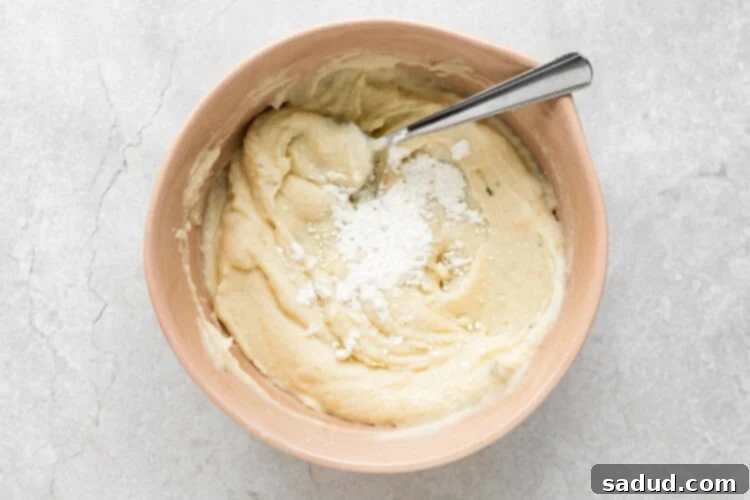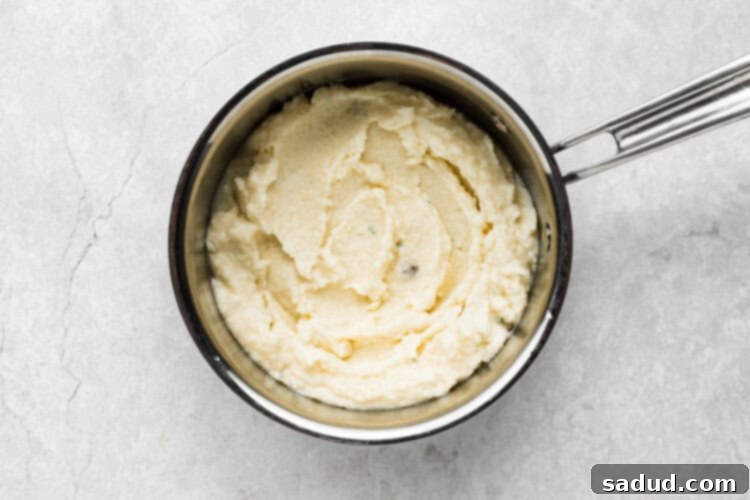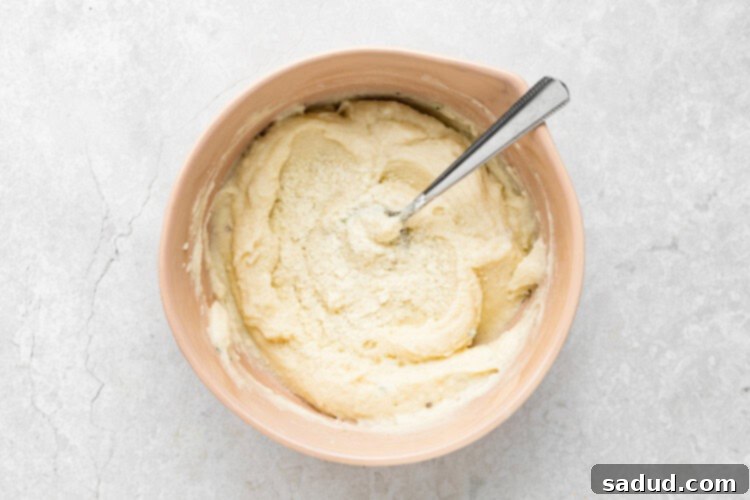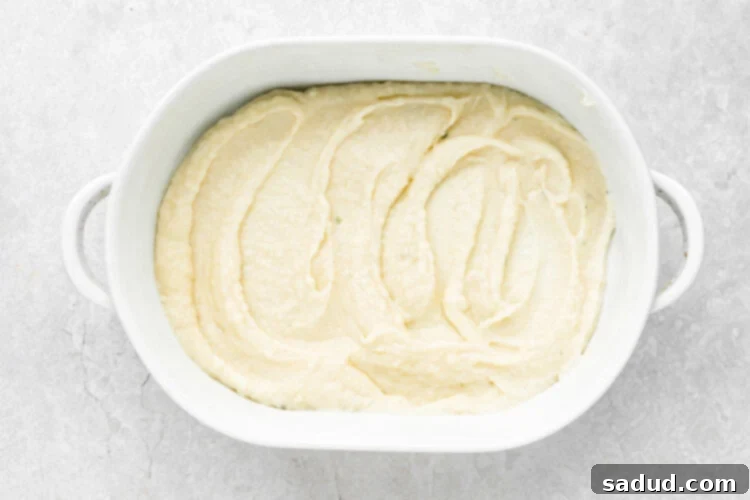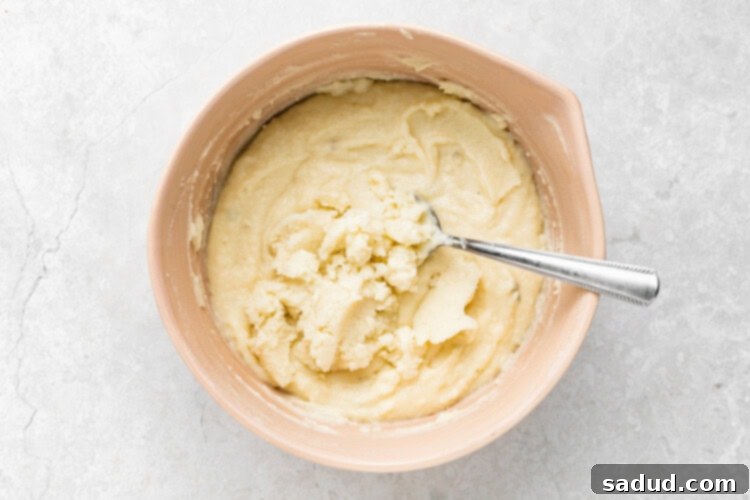How to Perfectly Thicken Mashed Potatoes: 5 Easy Fixes for Runny Sides
Don’t despair over soupy mashed potatoes! This comprehensive guide provides five simple, quick, and effective methods to thicken your mashed potatoes, ensuring a perfect, creamy texture every time. Whether you’re short on time or ingredients, these tricks will transform your runny spuds into a delightful side dish in minutes.
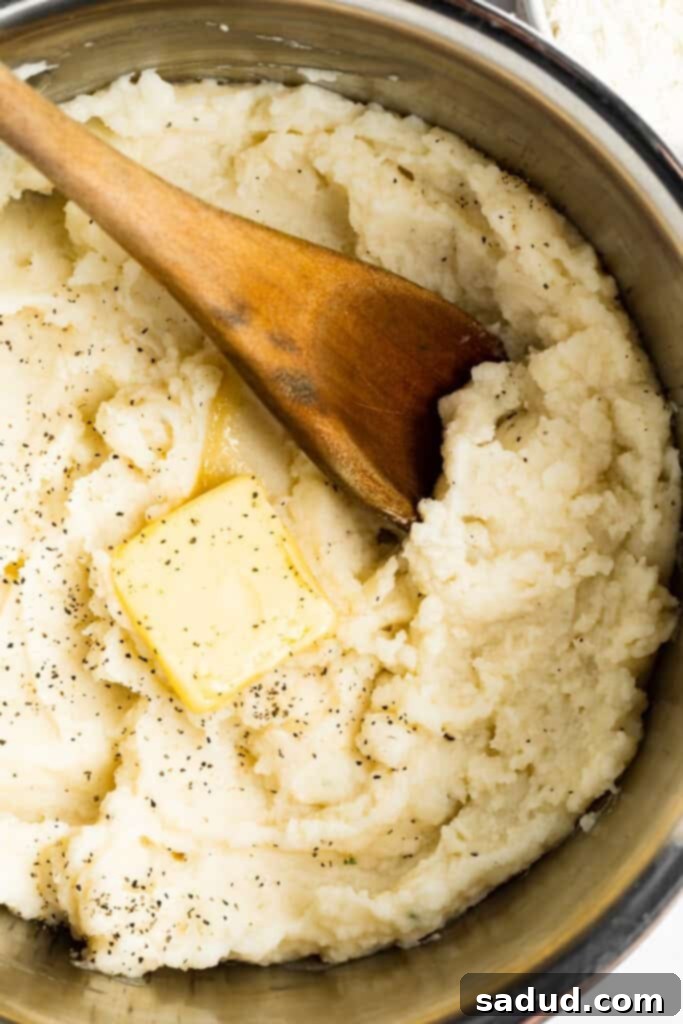
Why Your Mashed Potatoes Might Be Runny (And How to Prevent It)
Runny mashed potatoes are a common kitchen mishap, but understanding the culprits can help you avoid them in the future. The most frequent causes include:
- Too Much Liquid: This is the number one reason. Adding excessive milk, cream, or butter can quickly turn your fluffy potatoes into a thin, soupy mixture. Potatoes can only absorb so much liquid, and going overboard will leave you with a watery consistency.
- Waterlogged Potatoes: If your potatoes absorbed too much water during boiling, they’ll release it during mashing, leading to a thin consistency. This often happens if potatoes are over-boiled or not properly drained.
- Incorrect Potato Variety: Some potato varieties, like waxy potatoes (e.g., red or new potatoes), have a higher moisture content and tend to become gluey or watery when mashed. Starchy potatoes (e.g., Russet or Yukon Gold) are generally best for mashing as they break down easily and absorb liquid well.
- Over-Mashing: While not directly causing runniness, over-mashing potatoes can break down their starch cells excessively, releasing more moisture and creating a gummy, unappetizing texture that feels thinner than desired.
To prevent runny mashed potatoes, always boil potatoes until just fork-tender, drain them thoroughly, and allow them to steam dry for a few minutes before mashing. Add liquids gradually, incorporating them a little at a time until you achieve your desired consistency. Mashing them “dry” first can help you gauge their natural moisture content before adding any dairy.
The Benefits of Mastering These Quick Fixes
Having a few tricks up your sleeve for thickening mashed potatoes is invaluable for any home cook. These methods are praised for their:
- Speed and Efficiency: Designed for busy kitchens, these techniques require minimal time, typically just a few minutes, allowing you to salvage your side dish without delaying dinner. You can transform runny potatoes into perfectly textured ones in mere moments, making them ideal for last-minute adjustments.
- Simplicity and Accessibility: Many of these fixes require no specialized ingredients or equipment, using common pantry staples or basic cooking tools you likely already have. We’ve included a diverse range of options, ensuring that anyone, regardless of their kitchen setup, can successfully thicken their potatoes.
- Unaltered Flavor Profile: Crucially, these methods are designed to thicken your mashed potatoes without compromising their delicious, savory taste. The added ingredients are neutral in flavor or complement the potatoes, preserving the rich, buttery, and comforting flavors you worked hard to create. You can confidently apply any of these techniques, knowing your potatoes will taste as fantastic as they look.
- Versatility: Whether you’ve just started mashing or your potatoes have been sitting for a while, these methods can be adapted to various stages of preparation. From stovetop adjustments to oven fixes, there’s an option for almost every scenario.
- Waste Reduction: Instead of discarding a batch of otherwise delicious, but too-thin, mashed potatoes, these methods offer a practical solution to save your meal, reducing food waste and making your cooking more sustainable.
5 Proven Methods to Thicken Mashed Potatoes
Here are five reliable ways to turn your watery mashed potatoes into a creamy, dreamy side dish.
1. Use a Thickening Agent (Cornstarch or Flour)
Thickening agents like cornstarch or flour are incredibly effective for quickly firming up runny recipes. For mashed potatoes, cornstarch is often preferred as it has a more neutral taste and creates a glossy, smooth finish without affecting the potato’s flavor significantly. Flour, while effective, can sometimes impart a slightly chalky taste or gummy texture if not cooked out properly. If using flour, ensure it’s fully incorporated and cooked for a minute or two to prevent a raw flour taste.
How to do it:
To use a thickening agent, create a slurry first. Mix one tablespoon of cornstarch (or flour) with one tablespoon of cold water or milk until a smooth paste forms. Gradually whisk this slurry into your mashed potatoes, one tablespoon at a time, while gently heating them over low heat. Continue stirring until you reach your desired consistency. The heat is essential for the starch to activate and thicken the mixture. Be patient and add slowly, as starches can thicken quickly once heated.
2. Heat in a Pot (Evaporation Method)
This method works by gently heating the mashed potatoes on the stovetop, allowing excess moisture to evaporate. It’s a simple, ingredient-free solution that relies on the natural process of water removal.
How to do it:
Transfer your thin mashed potatoes to a large pot or a heavy-bottomed skillet over medium-low heat. Leave the pot uncovered to allow steam to escape. Stir the potatoes gently but frequently, about every minute or so, to prevent sticking and ensure even moisture release. Continue heating and stirring until the potatoes have reached your desired thickness. This process typically takes about 5-10 minutes, depending on how runny your potatoes are. Be careful not to stir too vigorously or for too long, as this can lead to a gummy texture.
3. Add Dehydrated Potatoes (Potato Flakes/Granules)
This is often a chef’s secret weapon for a quick fix. Dehydrated potatoes, commonly known as instant potato flakes or granules, are fantastic at absorbing excess liquid and enhancing the potato flavor and texture instantly. They are made from real potatoes and will blend seamlessly.
How to do it:
Stir one tablespoon of dehydrated potato flakes (or granules) into your runny mashed potatoes at a time. Mix gently until the flakes are fully hydrated and absorbed. Wait a minute or two to see the effect before adding more. Repeat this process until your mashed potatoes have reached the perfect consistency. This method is incredibly fast and effective, often working in mere seconds, and it naturally boosts that delicious, smooth potato flavor.
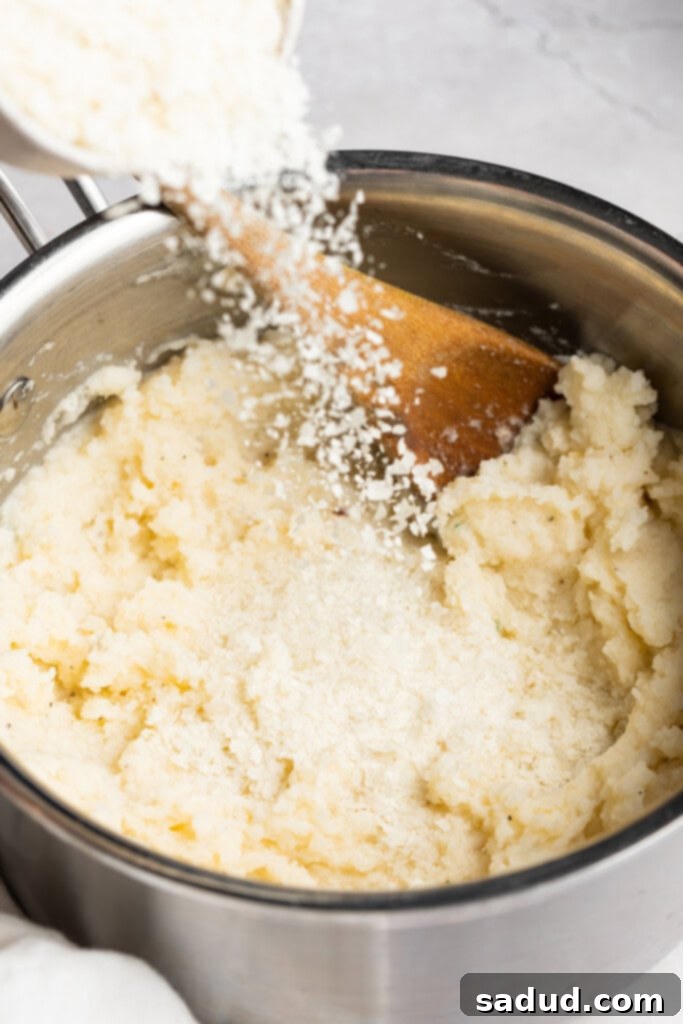
4. Bake in a Shallow Dish (Oven Evaporation)
Similar to the stovetop method, baking your mashed potatoes in the oven encourages moisture to evaporate, but it does so more gently and evenly, which can be beneficial for larger batches or if you prefer a slightly drier texture with a potential crispy top layer.
How to do it:
Preheat your oven to 350°F (175°C). Transfer your runny mashed potatoes into a shallow baking dish, spreading them out evenly to maximize the surface area exposed to the heat. This helps with more efficient evaporation. Place the uncovered dish in the preheated oven and bake for about 10-20 minutes, or until the desired consistency is achieved. Keep an eye on them to prevent drying out too much. You can give them a gentle stir halfway through if you wish.
5. Cook and Add Additional Potatoes
This method, while requiring a bit more effort and time, is arguably the best for maintaining the authentic potato flavor and texture. It involves simply adding more perfectly cooked and mashed potatoes to dilute the runniness.
How to do it:
Peel and cook a few extra potatoes (Russets or Yukon Golds work best) exactly as you would for making mashed potatoes – boil them until super soft and tender. Once cooked, drain them thoroughly and mash them separately until smooth. Gradually incorporate these freshly mashed, drier potatoes into your runny batch, stirring gently until you’ve achieved your desired consistency. This method naturally thickens the mixture while boosting the potato flavor and ensuring a perfectly creamy texture.
Chef’s Essential Tips for Perfect Mashed Potatoes
Beyond fixing runny potatoes, these tips will help you achieve mashed potato perfection every time:
- Avoid Over-Mixing and Mashing Your Potatoes: This is crucial. Over-worked mashed potatoes can quickly become gluey, gummy, and unappetizing. The more you mash or mix, the more starch is released, leading to this undesirable texture. Use a potato ricer or masher for light, fluffy results, and stop as soon as the potatoes are smooth. Hand mixing after adding liquids is often best to prevent over-agitation.
- Mash Potatoes Before Adding Liquid for Optimal Consistency Control: A key trick to prevent runny mashed potatoes in the first place is to mash them dry. Boiled potatoes retain a surprising amount of water, which only becomes apparent once they are mashed. By giving them a “dry” mash first, you can assess their natural consistency and then gradually introduce milk, butter, or cream, adding just enough until they reach your desired texture. This allows for much better control and reduces the risk of over-liquifying your batch.
- Never Give Up on Runny Mashed Potatoes! Repurpose Them Creatively: Even if your mashed potatoes seem beyond thickening, don’t throw them away! Unsatisfyingly thin mashed potatoes are incredibly versatile and can be transformed into other delicious dishes. They make an excellent base for a comforting potato leek soup or a creamy potato soup. You can also incorporate them into casseroles, use them as a topping for shepherd’s pie, or even turn them into crispy potato pancakes or croquettes by adding a binding agent and frying them. Think of them as a head start for another meal!
Frequently Asked Questions About Thickening Mashed Potatoes
Here are some common questions about how to perfect your mashed potatoes:
Can I use milk powder to thicken mashed potatoes?
Yes, powdered milk or dry milk solids can be an effective way to thicken mashed potatoes. Similar to dehydrated potatoes, they absorb excess liquid and add a creamy richness without altering the flavor too much. Add it a tablespoon at a time, mixing thoroughly, until you reach your desired consistency.
What if my mashed potatoes are still too thin after trying these methods?
If your potatoes are still too thin, it might be due to a significant amount of excess liquid or over-mashing. Consider combining methods, such as heating them in a pot while also adding a small amount of cornstarch or dehydrated potato flakes. As a last resort, lean into the “repurpose” tip and transform them into a delicious soup or casserole.
How can I ensure my mashed potatoes are never runny again?
The best prevention strategies include: using starchy potatoes (Russet, Yukon Gold); boiling potatoes until just tender, not mushy; thoroughly draining and letting potatoes steam dry for 5-10 minutes after draining; and adding dairy liquids (milk, cream) and butter gradually, mashing them in little by little until the perfect texture is achieved.
Do any of these methods change the taste of the mashed potatoes?
Most of these methods are designed to have minimal impact on flavor. Cornstarch is virtually flavorless, and dehydrated potatoes enhance the potato taste. Heating simply removes water. Adding more fresh potatoes also maintains the original flavor. Flour can sometimes leave a subtle taste if not cooked thoroughly, which is why cornstarch is often preferred.

Other Helpful How-Tos for Your Kitchen
- How to Cook Turkey Bacon in the Oven
- How to Reheat Mashed Potatoes
- Orange Zest – How to Make It and Ways to Use It
- How to Brine Chicken Wings
- How to Boil Artichokes
If you loved this recipe as much as we did, don’t forget to leave us a review below. ★ Follow Easy Healthy Recipes on Pinterest, Facebook, and Instagram, too!
For more delicious recipes, visit our sister sites, 40 Aprons and Easy Cheap Recipes.
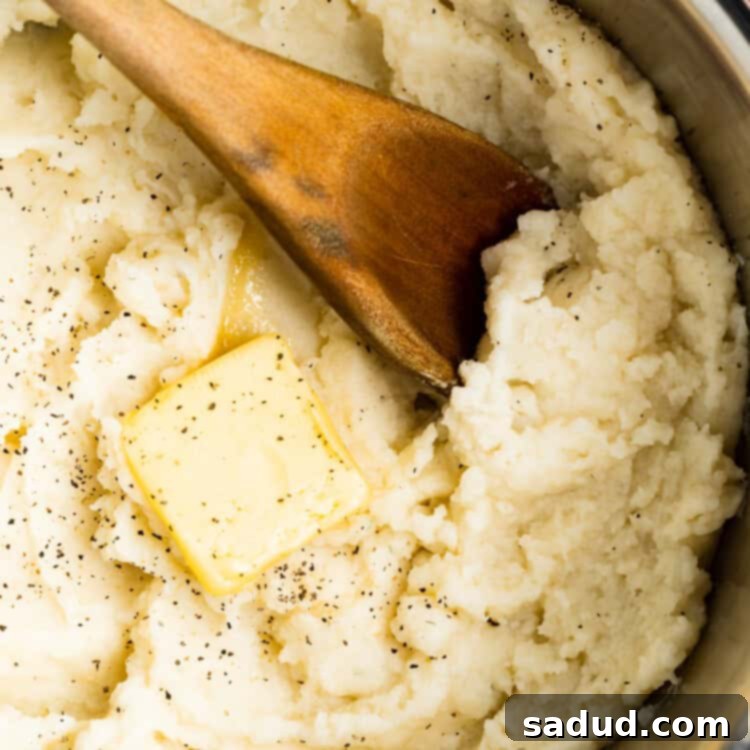
How to Thicken Mashed Potatoes (5 Ways)
 Cheryl Malik
Cheryl Malik
Print
SaveSaved!
Ingredients
- 4 cups runny mashed potatoes
- cornstarch optional
- dehydrated potatoes optional
- additional potatoes peeled, boiled, and mashed; optional
Equipment
-
medium pot
-
9×13 baking dish
Instructions
Method 1 – Use a Thickening Agent
-
Add one tablespoon of corn starch (pre-mixed with an equal amount of cold water to form a slurry) at a time, stirring gently over low heat until you’ve reached your desired consistency.

Method 2 – Heat in a Pot
-
Place your runny mashed potatoes in a pot over medium-low heat, uncovered. Stir every minute or so to encourage moisture to evaporate, until you’ve reached your desired consistency. Be careful not to over-stir as this can result in gummy mashed potatoes.

Method 3 – Add Dehydrated Potatoes
-
Stir in one tablespoon of dehydrated potato flakes (or granules) at a time until you reach your desired consistency, allowing a minute for absorption between additions.

Method 4 – Bake in a Shallow Dish
-
Transfer potatoes to a shallow baking dish and bake uncovered at 350° Fahrenheit for about 10-20 minutes, or until desired thickness is reached, allowing moisture to evaporate.

Method 5 – Cook Additional Potatoes
-
Peel and boil additional potatoes until very tender. Mash them separately, then gradually stir these freshly mashed potatoes into your runny batch until you’ve reached your desired consistency.

Notes
Nutritional values shown are general guidelines and reflect information for 1 serving. Actual macros may vary slightly depending on specific brands and types of ingredients used.
To determine the weight of one serving, prepare the recipe as instructed. Weigh the finished recipe, then divide the weight of the finished recipe (not including the weight of the container the food is in) by 8. Result will be the weight of one serving.
Nutrition Information
Number of total servings shown is approximate. Actual number of servings will depend on your preferred portion sizes.
Nutritional values shown are general guidelines and reflect information for 1 serving using the ingredients listed, not including any optional ingredients. Actual macros may vary slightly depending on specific brands and types of ingredients used.
To determine the weight of one serving, prepare the recipe as instructed. Weigh the finished recipe, then divide the weight of the finished recipe (not including the weight of the container the food is in) by the desired number of servings. Result will be the weight of one serving.
